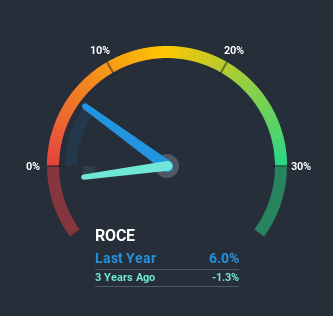- Taiwan
- /
- Construction
- /
- TPEX:6122
Returns On Capital - An Important Metric For King Polytechnic Engineering (GTSM:6122)
What trends should we look for it we want to identify stocks that can multiply in value over the long term? Firstly, we'd want to identify a growing return on capital employed (ROCE) and then alongside that, an ever-increasing base of capital employed. If you see this, it typically means it's a company with a great business model and plenty of profitable reinvestment opportunities. So when we looked at King Polytechnic Engineering (GTSM:6122) and its trend of ROCE, we really liked what we saw.
Understanding Return On Capital Employed (ROCE)
Just to clarify if you're unsure, ROCE is a metric for evaluating how much pre-tax income (in percentage terms) a company earns on the capital invested in its business. Analysts use this formula to calculate it for King Polytechnic Engineering:
Return on Capital Employed = Earnings Before Interest and Tax (EBIT) ÷ (Total Assets - Current Liabilities)
0.06 = NT$70m ÷ (NT$2.4b - NT$1.2b) (Based on the trailing twelve months to September 2020).
Therefore, King Polytechnic Engineering has an ROCE of 6.0%. In absolute terms, that's a low return but it's around the Construction industry average of 7.5%.
Check out our latest analysis for King Polytechnic Engineering

Historical performance is a great place to start when researching a stock so above you can see the gauge for King Polytechnic Engineering's ROCE against it's prior returns. If you want to delve into the historical earnings, revenue and cash flow of King Polytechnic Engineering, check out these free graphs here.
What Does the ROCE Trend For King Polytechnic Engineering Tell Us?
We're delighted to see that King Polytechnic Engineering is reaping rewards from its investments and has now broken into profitability. While the business was unprofitable in the past, it's now turned things around and is earning 6.0% on its capital. Interestingly, the capital employed by the business has remained relatively flat, so these higher returns are either from prior investments paying off or increased efficiencies. That being said, while an increase in efficiency is no doubt appealing, it'd be helpful to know if the company does have any investment plans going forward. After all, a company can only become a long term multi-bagger if it continually reinvests in itself at high rates of return.
On a side note, we noticed that the improvement in ROCE appears to be partly fueled by an increase in current liabilities. Essentially the business now has suppliers or short-term creditors funding about 51% of its operations, which isn't ideal. Given it's pretty high ratio, we'd remind investors that having current liabilities at those levels can bring about some risks in certain businesses.The Key Takeaway
To sum it up, King Polytechnic Engineering is collecting higher returns from the same amount of capital, and that's impressive. And with a respectable 94% awarded to those who held the stock over the last five years, you could argue that these developments are starting to get the attention they deserve. So given the stock has proven it has promising trends, it's worth researching the company further to see if these trends are likely to persist.
If you want to continue researching King Polytechnic Engineering, you might be interested to know about the 3 warning signs that our analysis has discovered.
If you want to search for solid companies with great earnings, check out this free list of companies with good balance sheets and impressive returns on equity.
When trading King Polytechnic Engineering or any other investment, use the platform considered by many to be the Professional's Gateway to the Worlds Market, Interactive Brokers. You get the lowest-cost* trading on stocks, options, futures, forex, bonds and funds worldwide from a single integrated account. Promoted
Valuation is complex, but we're here to simplify it.
Discover if King Polytechnic Engineering might be undervalued or overvalued with our detailed analysis, featuring fair value estimates, potential risks, dividends, insider trades, and its financial condition.
Access Free AnalysisThis article by Simply Wall St is general in nature. It does not constitute a recommendation to buy or sell any stock, and does not take account of your objectives, or your financial situation. We aim to bring you long-term focused analysis driven by fundamental data. Note that our analysis may not factor in the latest price-sensitive company announcements or qualitative material. Simply Wall St has no position in any stocks mentioned.
*Interactive Brokers Rated Lowest Cost Broker by StockBrokers.com Annual Online Review 2020
Have feedback on this article? Concerned about the content? Get in touch with us directly. Alternatively, email editorial-team (at) simplywallst.com.
About TPEX:6122
King Polytechnic Engineering
Operates as an integrated engineering and construction company in Taiwan and internationally.
Adequate balance sheet and fair value.
Market Insights
Community Narratives




